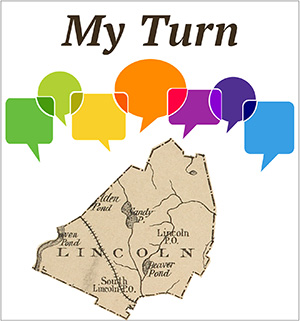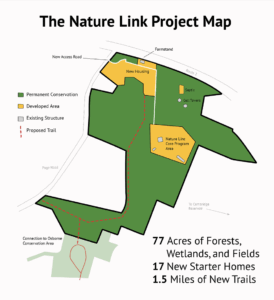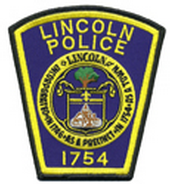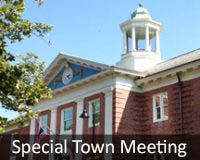(Editor’s note: This letter concerns the Farrington/Panetta proposal — for more information, see “Corrections and more information on Farrington/Panetta proposal” and this RLF slide deck.)
By Page Road residents (see below)
A Special Town Meeting will be held on June 25, where voters will decide whether to rezone privately owned land into the North Lincoln Overlay District — a move that would allow the Nature Link Project to bypass Lincoln’s long-standing zoning laws and build 20 homes on just six acres, with significant impact to our conservation land and our neighbors.
We believe every Lincoln resident deserves the full picture before casting a vote. Here’s what you need to know:
1. No public input in calling the meeting
Normally, calling a Special Town Meeting requires 200 resident signatures. While the Select Board has discretion to also call a town meeting, in this case, they decided to call a meeting on behalf of a private organization, the RLF, without notifying a single abutter or resident in the area. After the meeting was already scheduled, communication to the neighborhood has been minimal and misleading:
- Only some Page Road residents received a vague flyer.
- That flyer promoted a “neighborhood meeting” but did not disclose the project’s full scope.
- Many residents only learned about the 20-house development at the April 30 meeting—more than two weeks after it was approved by the Selects and less than two months before the vote.
If the project is truly good for Lincoln, why secrecy?
2. The developer: Civico and the profits at stake
This meeting mainly exists to enable Civico Development to bypass zoning laws. They plan to:
- Build 17 new homes and rebuild 3 existing homes—20 in total—on a site that under current zoning would allow only 3.
- Avoid Lincoln’s zonings rule and increase density drastically.
Estimated revenue (based on comparable sales in nearby towns):
- 14 homes x ~$1.2M = $16.8M
- 3 affordable homes x $0.4 = $1.2M
3 larger homes (4,000–4,500 sq ft) x ~$2.6M = $7.8M - Total: ~$25.8M
Land cost to Civico? Just $3.3M — roughly 13% of project value, far below the 20–33% range typical in suburban development.
Normally, developers must dedicate part of their purchased land for septic systems, reducing the number of houses they can build. With this deal, Civico avoids this entirely by using Farrington’s land for the septic system, letting them maximize housing density (and profits) without sacrificing a single square foot. Why should Lincoln enable this private windfall?
3. No-bid development: why Civico again?
This isn’t the first time Civico has been granted a no-bid, developer-friendly deal in Lincoln:
- Oriole Landing, the Mall redevelopment, and now Nature Link have all followed this pattern.
- No competitive process was offered, despite millions in potential profits.
Civico receives:
- Zoning exceptions
- Public access to land for septic infrastructure
- Publicly funded trails which increase housing value
- Below-market land prices
In return, Civico contributes very little. If this project benefits the town, why not open it to other developers?
4. Conservation Deal Tied to Development — Why?
The Nature Link project is being tied to a conservation agreement with the Farrington property. But the funding for conservation already existsfrom:
- The City of Cambridge
- Private fundraising
- The Town of Lincoln
So why bind it to housing? Because:
- Civico can then use land paid for by the town for septic systems and access roads, saving the developer money and increasing housing density.
- This means public conservation land is subsidizing private development, at no cost to Civico.
Farrington’s land was meant for preservation, not as infrastructure for a private developer. This sets a troubling precedent.
5. The “$3M Gap” Myth
RLF argues that if Civico doesn’t build these homes, the $3M from the Panetta land deal won’t materialize, and the conservation effort will collapse. But here’s the truth:
- The “gap” exists only because RLF linked two unrelated land transactions.
- Panetta land, 6 upland acres with 3 homes, is worth $3M+ on the open market.
- Even without Civico, other buyers or developers could step in, without needing zoning changes.
RLF also claims Farrington needs a new access road via Panetta’s land, but improving the existing Route 2 access would cost only $250K (based on Farrington’s own prior estimates, adjusted for inflation).
A flawed deal — and a better path forward
The proposed Farrington agreement represents a flawed compromise that depends on the construction of 20 single-family homes. To enable this development, the plan would:
- Clear-cut a forested section of Farrington’s land, and
- Install a large-scale septic system serving all 20 homes at the property’s highest elevation.
This elevated leach field would pose a serious, long-term threat to the protected wetlands below, which form a tributary of the Cambridge watershed, an ecologically sensitive and critical area. The good news: these 20 homes do not need to be built. Existing funding is already sufficient to compensate Farrington for placing a conservation restriction on their land. The sole justification for moving forward with the Panetta purchase and related development is to provide Farrington with improved access to Route 2. But there is a smarter, lower-impact alternative.
According to a study commissioned by Farrington—and adjusted for construction cost inflation—upgrading Farrington’s existing access point to Route 2 would cost approximately $250,000. This would provide significantly better access than Page Road and eliminate the need for environmentally damaging housing construction. If Cambridge and Lincoln each contributed $1 million—a modest increase over current commitments—they would more than cover this access improvement and secure the conservation deal without new development.
This is a rare opportunity to do what’s right:
- Conserve valuable open space
- Protect the watershed
- Avoid irreversible ecological damage
And yet, the Rural Land Foundation (RLF) has returned to its familiar playbook: fear-based messaging. “If we don’t act now,” they warn, “Farrington will be clear-cut.” But these alarmist tactics have grown stale.
Just last year, in the lead-up to the Housing Choice Act vote, the RLF publicly stated that Civico would never return to Town Meeting seeking project approval. Yet here we are, only a year later, facing that very scenario.
They also claimed that unit density at the Mall project couldn’t be reduced—until they themselves introduced a late amendment at Town Meeting, before any resident had a chance to speak.
It’s time for accountability
We can — and must — pursue a conservation strategy that respects both the environment and the community’s values. The current proposal fails on both counts. We urge residents to demand transparency, challenge false choices, and support a solution that protects Lincoln’s future — without sacrificing its integrity.
Even if you’re not an abutter, this precedent affects your neighborhood too. If zoning laws can be bypassed quietly once, what’s to stop it from happening again? Your voice matters. Attend the Special Town Meeting on June 25. Demand transparency, fairness, and accountability from our town leaders. Ask questions. Spread the word. Vote informed.
Klaus and Iwona Dobler, 103 Page Rd.
John and Cindy Li, 96 Page R.
Dr. Jeff Sutherland and the Reverend Arline Sutherland, 100 Page Rd.
(Editor’s note: The Rural Land Foundation plans to submit a response in the next few days.)
“My Turn” is a forum for readers to offer their letters to the editor or views on any subject of interest to other Lincolnites. Submissions must be signed with the writer’s name and street address and sent via email to lincolnsquirrelnews@gmail.com. Items will be edited for punctuation, spelling, style, etc., and will be published at the discretion of the editor. Submissions containing personal attacks, errors of fact, or other inappropriate material will not be published.




